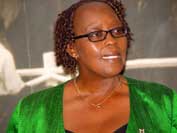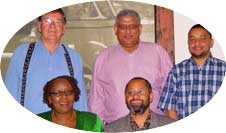 Elizabeth Thabethe, Deputy Minister of Trade and Industry
Elizabeth Thabethe, Deputy Minister of Trade and Industry |
Hout Bay is no doubt a beautiful place, it is a place that brings back fond memories to me when I was a 'new arrival' in Cape Town in 1994. Whenever there was a moment to spare, which was not often, I took my grandson and daughter on a bus ride from the city centre to Hout Bay. My only goal to have some fresh grilled snoek here at the harbour. I wish there were more of those days but as the saying goes, duty calls and one has to answer.
The reality of Hout Bay though is that Hout Bay like many areas in our country is a perfect example of what our President calls, the dual economy. The one rich and well-resourced the other under-resourced and often survivalist in nature.
My responsibility as one of the two Deputy Ministers of Trade and Industry is therefore to ensure that I contribute and actively participate in ensuring that those of our communities, like Imizamo Yethu and the fishing community living in the flats on the hills," too enjoy the happiness that comes with a growing economy," the words of our President in his State of the Nation Address this year.
 Robert Harrems, pum, Country Co-ordinator (The Netherlands)
Robert Harrems, pum, Country Co-ordinator (The Netherlands)
Lesley Africa, CEO, WECBOF
Timothy Jacobs, Advisory Board, HBBOF, Elizabeth Thabethe, Deputy Minister Trade & Industry
Greg Louw, CEO, HBBOF |
Honoured guests, South Africa is enjoying economic growth like never before, more than 4% per year for the past few years but the growth is not shared. Too many of our people are on the margins of the economy. How do we ensure that more and more of our communities who have never had the opportunity to run their own businesses now are able to. The responsibility for this falls largely to the Department of Trade and Industry as the lead department in the Economic Cluster of government. Our task is to accelerate the growth by ensuring that more and more South Africans become part of the mainstream economy. This is our main strategy to fight poverty and create jobs.
The Department of Trade and Industry has 19 Council of Trade and Industry Institutions besides the various departments housed at
the dti campus in Pretoria. Some of these agencies might be familiar, like the National Lotteries Board, I'm afraid that I can't give the winning numbers for the first draw tonight though.
Some of the other agencies and their responsibilities are:
- CIPRO the Companies and Intellectual Property Registration Office which should be your first stop when wanting to start a business
- Khula Enterprise Finance Limited which provides wholesale financial support to small, medium and micro enterprises
- NEF, National Empowerment Fund that funds economic empowerment and black business as well as promoting savings and investment amongst HDI's
- IDC, the Industrial Development Fund that promotes technology development in manufacturing industries in South Africa
- seda, the Small Enterprise Development Agency provides non-financial support to small enterprises
These are as I said a few of the 19 agencies who provide support to businesses. I urge all aspiring businesspeople to do the right thing when starting out. Get registered, do it the legal way. Try to avoid consultants, some of them charge you double and in the worst cases I've heard even 10 times the amount to register your business.
Honoured guests the dti has a range of services to assist those trying to start or sustain or grow businesses. Our systems are not perfect but there is a plan to make our processes simpler like matters of access to information, access to finance and other obstacles that stand in the way of making your business a success. Some of the "in-house" departments at the dti is;
The Enterprise Organization whose main job it is to stimulate and facilitate the development of sustainable and competitive enterprises. Some of their products are:
- BBSDP, the Black Business Supplier Development Programme that provides a 80:20% cost sharing grant, offering support to black owned enterprises
- Co-operatives Incentive Scheme offers a 90:10% matching grant
- Foreign Investment Grant
- Export Marketing and Investment Assistance
Honoured guests further growth can only be accelerated and sustained if all South Africans are meaningfully integrated into the economy. This is why government introduced a comprehensive and focused strategy for broad-based black economic empowerment (B-BBEE). The B-BBEE strategy outlines government policy towards black economic empowerment (BEE). The policy concentrates on government intervention to address the exclusion in the past of the majority of South Africans from full participation in the economy. The Code of Good Practice is readily available and has been adopted.
 Nomsa Nkata, CEO
Nomsa Nkata, CEO
South African Women Entrepreneurs Network (SAWEN)
|
Women are the backbone of the Second Economy, the words of our Deputy President. If we are serious about getting more of our communities involved in the mainstream economy we have to create an enabling environment for those who struggle the most to enter the business world. To this end
the dti fully supports the South African Women’s Entrepreneurs Network (SAWEN) as a vehicle for those women who aspire to start their own business or who want to grow their businesses. SAWEN is fully supported financially and administratively by the Gender and Women's Empowerment Unit at
the dti.
One of the major interventions
the dti is aiming to achieve before the end of 2007 is the establishment of the South African Women's Entrepreneurs Fund. The fund will provide loans and business support to develop profitable women owned enterprises. The fund is geared towards addressing the funding needs of women owned enterprises with loans ranging from R250 000 to R1 million. The unique selling point of this fund will be to provide these enterprises with special procurement or tender loans to be able to render relevant services after being awarded a tender deal.
the dti believes that through facilitating the meaningful participation of all our people in the growth of our economy, we will be making a contribution to a fundamental transformation of our economy. The task is not an easy one. We do recognise that a lot more work will have to be undertaken to achieve this.
One of the initiatives that I've started is the Taking
the dti to the People' campaign. I have visited eight provinces holding on average three information sessions per province. The Western Cape will be visited before the end of the year. We have information sharing sessions with communities where we try to have as many of our units and agencies present. My aim is to cover all the municipal districts end of 2008.
I hope that the information I have shared would be of use to yourselves. Make use of
the dti services as well as those offered by provincial and local government.

